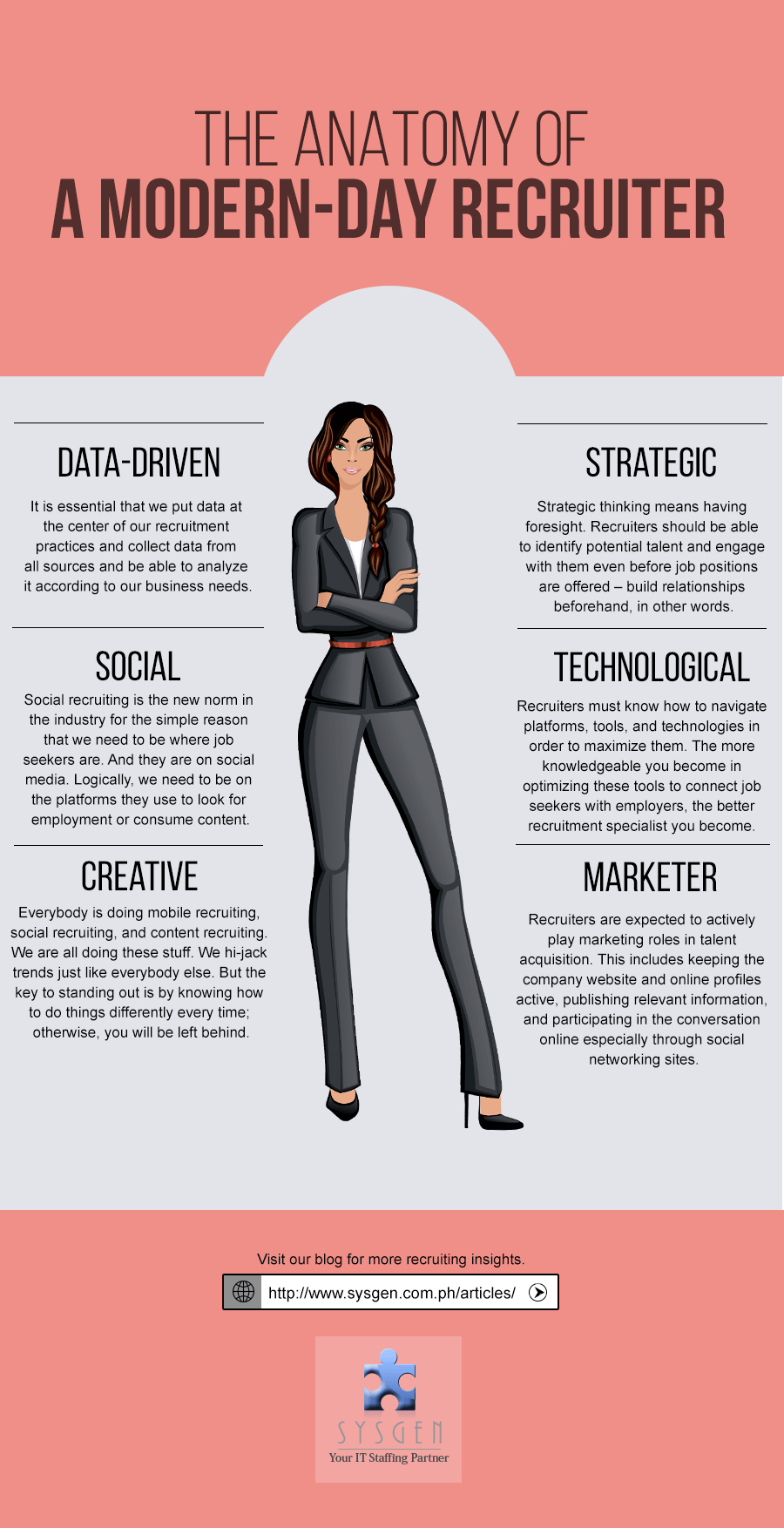The recruitment industry is a fast-changing field. The dynamic relationship between recruiters and job seekers change exponentially as well. Today, candidates have been given more power in the hiring manager/job applicant relationship. In 2015, about 90% of recruitment professionals said that candidates mainly drove recruiting. And this dynamic relationship is mediated by technology.
The introduction of job search sites, professional networking sites, and applications among others allows job seekers easier access in the job market; by simply uploading their resumes online and building their portfolio, recruiters can easily find them and assess their credentials. In the same vein, employers, using technology, can conveniently broadcast career opportunities.
But as technology changes, so do the way recruiters touch base with prospective job candidates.
It is, therefore, imperative that recruiters constantly update their skills to accommodate changes in technology relevant to recruiting and keep up with the growing and changing demands from both employers and employees.

Data-Driven Mindset
Data can help us make sense of everything we do or fail to do. Good data analysis informs and guides decisions throughout the recruitment process. Therefore, it is essential that we put data at the center of our recruitment practices and collect data from all sources and be able to analyze it according to our business needs.
Knowing how to use digital assets like your website, career pages, web and mobile apps, and even third-party recruitment tools are different from crunching and analyzing data. It is not enough that we know how to use these tools; it is beneficial that it informs us how we are doing through data.
There are many ways to collect data. There are many channels to get data from. There are many ways to treat or manipulate data, as well. So, collect and manipulate data according to the business or recruitment goals you need to achieve.
Strategic Thinking
Strategic thinking means having foresight. Recruiters should be able to identify potential talent and engage with them even before job positions are offered – build relationships beforehand, in other words.
Why is this important?
In a survey by Deloitte, it was revealed that companies spend an average of $4,000 to fill an open position. In a separate study, it was found that 47% of job offers in 2015 did not push through because the candidates accepted other proposals.
Needless to say, firms spend and waste a lot of money to fill an open position. Hiring managers and recruiters would want to fill open positions fast to minimize cost. While aiming for speed of hire, they also want quality hires. This is where strategic thinking comes in.
If a recruiter or a hiring manager has already established a network of engaged top talents, it would be easier for them to reach out to them. So, be a well-adjusted recruiter who can identify potential top talents, and build a good relationship with them even before a job availability. You can do this by nurturing your leads in the form of online engagements and relationships built through data-driven analytics.
Social Recruiting Skills
Social recruiting is the new norm in the industry for the simple reason that we need to be where job seekers are. And they are on social media. Logically, we need to be on the platforms they use to look for employment or consume content like Facebook, Twitter, Instagram, and even on LinkedIn.
According to a Glassdoor report, 79% of employees use social media to look for jobs, while 86% of people use social media in job hunting within the first 10 years of their careers.
Social recruiting does not end with a job ad. You must strategize how to use social media towards reeling in the best of the best and keep them engaged before making the first contact about a job opening.
Technological Aptitude
Recruiters must know how to navigate platforms, tools, and technologies in order to maximize them. The more knowledgeable you become in optimizing these tools to connect job seekers with employers, the better recruitment specialist you become. This is crucial for companies who are targeting the Millennial demographic, which is slated to make up 50% of the workforce by 2018.
Advanced Negotiation Skills
A great recruiter part salesperson, marketer, and negotiator. A great recruiter should be capable of making compelling proposals. They must know how to sell opportunities, tangible, and intangible benefits alike. Mastering the art of negotiation is crucial to getting the best in the workforce, especially the ones coming from the Millennial demographic. These younger professionals are opportunities-driven. Salary and benefits are not only important factors in recruitment anymore.
Creativity
Everybody is doing mobile recruiting, social recruiting, and content recruiting. We are all doing these stuff. We hi-jack trends just like everybody else. But the key to standing out is by knowing how to do things differently every time; otherwise, you will be left behind.
A great recruiter must, therefore, be more creative in using new technologies for recruitment. Creative recruiting strategies are critical to source, attract and then retain the cream of the candidate crop.
Result Orientation
A result is a final output for everything. And it’s what matters the most. A desirable result is a result that has achieved the goals set beforehand. For recruiters, this could be a certain number of placements or hires. Therefore, this is what every recruiters’ orientation be: Results.
There are means to this end. There are processes we go through to achieve our recruitment goals. While we try a manifold of techniques, strategies, or paradigms, we must not lose sight of our primary goal and deliver positive results. A great recruiter must have a sense of urgency, drive, and grit. They ensure the alignment with business and takes responsibility to keep projects on track.
Advanced Marketing Skills
As a recruiter, you are expected to actively play marketing roles in talent acquisition. This includes keeping the company website and online profiles active, publishing relevant information, and participating in the conversation online especially through social networking sites. Careers sites that are optimized for mobile consumption are likely to get higher shares when it comes to job searches.
Employer Branding
Are you a great company to work for? The answer will largely determine your attractiveness to candidates. This is what we call employer brand. And it is important. A study found that 69% of job hunters are more likely to apply for a job opening if the employer has a clear, compelling brand. This means that job seekers require more than just a competitive salary and benefits to jump ships; culture matters.
Read: How to Craft a Compelling Employer Brand in 9 Easy Steps
Mobile Marketing
Recruiters should embrace mobile marketing skills and make most of the mobile revolution to be able to reach out and access the talent pool of candidates via mobile.
Because every individual is using mobile more than any other gadgets, so recruiters should know how to branding their company in mobile, this will become easy for them to source or find out the right candidate.
Read: 4 Ways to Maximize Mobile Platforms and Tools for Sourcing and Recruiting
Content Recruiting
Content recruiting is the practice of using content marketing to brand and promote your company and acquire and retain top talent. But why content recruiting? It’s simple. Candidates have been given more power in the hiring manager/job applicant relationship. Sixty percent of a buyer’s decision is already made before he or she wants to even speak with a salesperson, or in this case, a recruiter or a hiring manager. This shift of power from the hiring manager to candidate means you will need to sell the candidate without cold calling him or her.
Key Takeaways
The recruitment industry is a fast-changing and challenging field. As the dynamic relationship between the hiring manager and the applicant changes through time and technology, so must our strategies and attitude towards recruiting. Let data inform and drive every decision. Let’s be where our target audiences are. Most importantly, strive for genuine relationships and let your unique employer story be heard.
Sources:
“9 Ways To Use Content Marketing As A Recruiting Tool”. 2014. Content Marketing Institute. Accessed February 28 2017. http://contentmarketinginstitute.com/2014/12/content-marketing-recruiting-tool/.
17 Crucial Recruiting Statistics For 2016″. 2016. Beamery Blog. Accessed February 28 2017. https://blog.beamery.com/recruiting-statistics-2016/.

